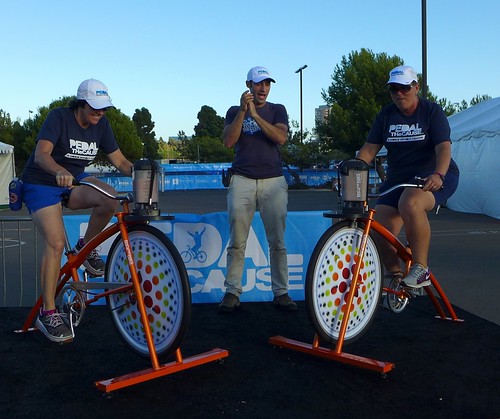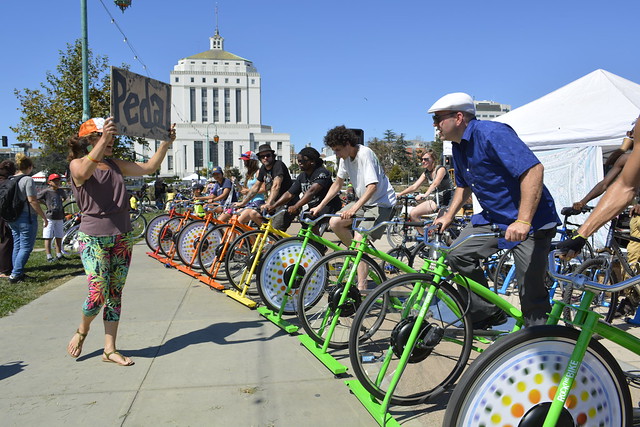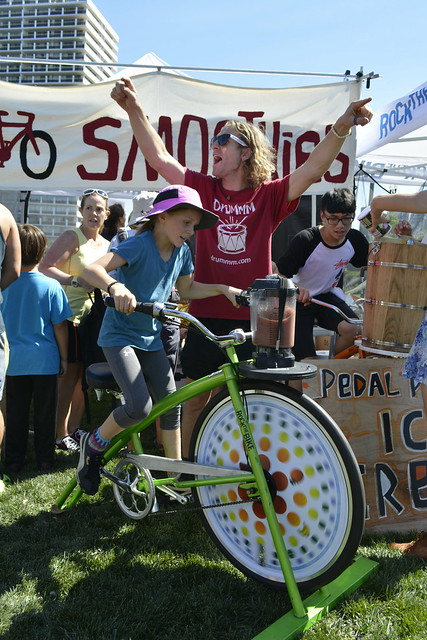What is a coach?

You’ve gone to great lengths to have an interactive Pedal Power activity at your event, and you want the best results. We’ve found that having a “coach” is essential to having a hit. Once you read all the different things a coach does, you’ll want one too. The person who greets your group as they come up to the bike, who answers their questions, who reassures them that they’ll do fine even if they haven’t been on a bike in a long time, who helps them get on and off, who leads the cheering for them — that’s the coach.
Coaches function as the host, making sure the bike works optimally for each rider and that everyone has a fun and uplifting experience with Pedal Power. You can provide your own coach — it’s not difficult to be a good one. Our trained staff is also available if you want to hire the pros (look under Services to see which activities we can provide a crew for). In the end, it doesn’t matter who supplies the coaches, only that you have one for every rider.
The Benefits of Having a Coach
Having a coach instantly makes your Pedal Power activity a warm and lively attraction. It means you have someone stationed at the activity whose only job is to think about the pedalers — their safety, fun, and learning. That kind of undivided attention means that everyone gets the bike adjusted to fit them well — if the seat is too high, the rider will strain to reach the pedals; if it’s too low, the rider does not get a strong experience of their own muscle power. Having a coach means people get thoughtful answers to their questions. It also means a lot of positive energy buzzing around your booth.
What Coaches Do
The job of coaching is:
- To know the activity
- To bring people out of their shell and get them participating in the activity
- To make each rider comfortable on the bike
- To get each rider on and off the bike safely
- To positively energize the experience for everyone

At Maker Faire 2016, we did it 2,000 times — that is, helped people (mostly kids) on and off our bikes, while giving them a clear idea of what they were supposed to do on the bike.
Depending on the activity, coaches may also have more specific tasks. With Bike Blending, the coach encourages people to power their own smoothie — “You should pedal, not us — it’s a lot more fun!” Sometimes the coach is the person who handles the money – rather than the smoothie chef, for instance, who should handle only food.
At a Pedal Powered concert, the coach goes out into the crowd, and uses charm and personality to pull in fresh pedalers: “Come on, it’s easy! Try a song or two.” The coach pays close attention to the Pedalometer, knowing that pedalers can get lost in the music. When Pedal Power is in danger of running out, the coach encourages the pedalers to crank out more watts. When a pedaler begins to wane, the coach thanks them and recruits a new one.
If you will have many pedalers powering a concert, you may want your coach to hold up a sign letting the pedalers know when it’s time to crank out the watts. Look at the video below for some nice shots of Sarah communicating by sign with a phalanx of pedalers:
The coach can be your ambassador. You can charge the coach with directly imparting your message — “Kaiser cares about your health and your fitness” — talking one-on-one with pedalers and potential pedalers, and/or handing out brochures or wearing your slogans on a staff T-shirt, or asking people to check out your table or sign up. Because people are happy, alert, and open after pedaling, which still starts up that Song of the Open Road in the heart even when childhood was long ago, they will be receptive and able to focus on your message after a turn on the bike.
The coach asks people to stand in line or picks the next pedaler from the crowd. Or the coach gets people to give pedaling a try, cajoling them and bringing out their competitive spirit. A good coach is someone who assumes that everyone wants to try but some may need to be brought out of their shell. The coach infuses the entire experience with care, making the activity so clearly stable and trustworthy just by standing there that they are erasing all doubts and guaranteeing a good Pedal Power experience.
What Makes a Good Coach
No matter the activity, all coaches need to be outgoing and energetic. You may already have, on your staff or your volunteer roster, just the sort of positive extravert you’ll need. You’ll want to identify several people who can fill the role at your event. Even someone who is energized themselves by lots of contact with people will find a whole day of coaching to be too much, and lose focus. Their energy will feel flat, and they won’t be passing good energy on to the crowd.

People in the crowd get on and pedal (hard sometimes), and use their body for something out of the ordinary. Most people in mainstream crowds have not been biking in a while, and need a little handholding. But everyone, deep down, has positive associations with pedaling, and the coach should carry that attitude: This is good. Enthusiasm is good, too — you want the coach to cheer for the pedalers, to say, “Nice going! You did it!” And the coach may have an opportunity to teach a curious pedaler about the science behind Pedal Power.
Coaching and Children

Coaching children is fun and rewarding. It also brings a different set of tasks to coaching, and a different way of thinking. Coaching kids takes more focus, more energy, more powers of observation, and more ability to see the fun in any situation than coaching adults. It also requires more time per rider, so you’ll want more coaches. Having bikes where kids are present also means the coach will want to pay more attention to safety, of bystanders as well as pedalers. The coach needs to make sure the bikes are never left unattended, never leaving open the possibility that a curious child could climb a bike alone and get hurt.
There will be plenty of plain old helping kids clamber on and off the bikes — and most importantly, fitting the bikes to the various kids. There will also be answering lots of questions. Coaches will want to have positive interactions with children who badly want to pedal but are too small for the bike (preschoolers through 1st grade) and their parents — maybe suggesting that the child stand next to the bike while the parent takes their picture. Coaches will moderate the inevitable situation where one child has rushed in front of another to take a turn, etc. Experience in this sort of thing can be helpful.
The Personality Traits of a Good Coach
A good coach:
- Likes kids
- Likes people in general
- Is extraverted
- Comes to life at events
- Is observant
- Will rep your cause or company well
- Thinks well on their feet
- Is physically quick and strong

It’s fun job for somebody — who would be good? Your sales rep? His teenage kids? Don’t forget, we’re happy to provide crewing services anytime — which may be especially helpful the first time out. Just be sure to set it up well in advance of your event. If you’re ready, email us at customerservice@rockthebike.com to see if we can accommodate your dates.


